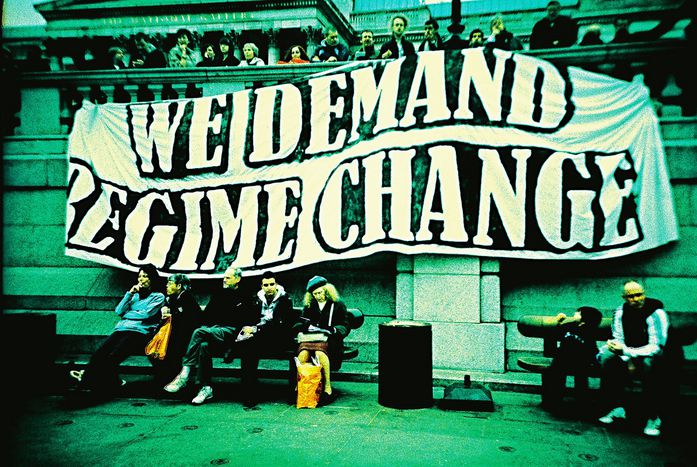
The 61st hour: no love for 'Europe day' on 9 May
Published on
Translation by:
Cafebabel ENG (NS)Poor Greece, tough nuts Schwarzenegger, people's populism and economic depression. Robert Schuman, the-then French foreign minister who proposed the concept of the European Union on 9 May 1950, would be rotating in his grave. In spite of its celebratory pompous institutionalism and political speeches today, Europe is not in its finest hour
1. Don’t cry for me, Europeans. The truth is you're all depressed
Europe is depressed. And those are not our words. The president of the European council, Herman von Rompuy, said it himself at an innovation conference on 4 May, five days before the European union turned 61. The former Belgian prime minister believes that the EU needs positive citizens to be able to make an economic turnaround. No point in crying over spilt milk: forget the budgetary and social cuts which have left health and education systems mutilated in various member states, the key, my bee, is to stay full of glee! We’ve certainly been stupid if that’s how easy it turned out to be to get over a crisis which left countries like mine - Spain - with almost five million unemployed.
2. More rescues, more conflict
Despite what the EU’s new self-appointed spiritual guru says, the old continent is facing new hurdles which make it realistically difficult to remain positive, never mind celebrate this anniversary. Take Greece for example, which is needing a capital injection to avoid the suspension of its bailout down payments. It’s part two of the financial rescue package which has been so controversial amongst member states of the EU. ‘I can't see us ever writing a cheque directly from the British tax payer to the Greeks, Portuguese or anyone else - Ireland was a special case,’ said George Osborne, chancellor of the exchequer in Britain, in a BBC interview on 8 May. The Greeks would need 25 to 20 thousand million euros more to try to renegotiate the difficult conditions of the former rescue package, as Ireland did. EU values are crumbling like a house of cards.
3. Populists bring it on
Finland’s toughest lads and laddesses, the recently crowned ‘True Finns’, are the figurehead of anti-rescue operations in Scandinavia. They’re part of a wave of populists who are currently threatening the European union's existence, in their battle to reclaim some of their lost sovereignty to the detriment of a common solidarity. In France, the new leader of the far-right party the national front, Marine Le Pen, is following in the footsteps of her father, the founder of the movement, and presenting herself as a candidate for the country’s 2012 elections. A rising star of the political galaxy, her political agenda strikes a heavy hand on immigration. She is no fan of pan-European ideas (euro, Schengen, pffff). Other examples are plentiful: take Italy’s Lega Nord (Northern league) party or Germany’s national democrats (NPD). Even centre-right parties such as Spain’s opposition Popular Party (Partido Popular, PP) are trying to drive their electorate into a populist trap with initiatives such as immigrants signing the ‘integration contract’, first mentioned under 2012 candidate Mariano Rajoy in 2008.
4. Doors closing
The great French president, a man obsessed with political as well as his own physical heights, knows a lot about point number four. The island of Lampedusa has been letting in so many immigrants that Scandalised Sarkozy positively slammed the doors to his country shut. Nicolas' grandiloquent cries were echoed around Brussels who got straight to work on Sire’s orders. The result is that at a Franco-Italian summit on 27 April calls were made to revise and modify the open-border treaty to avoid future post-Arab spring revolution migrations. Nor is this the first time that Sarkozy fixes something that is ‘broke’ like that…
5. Superhero applications open; hasta la vista HvR
What would be left if Europe gave up its single currency and activated to fight the free movement of goods and people? Who’d save Europe from this kind of attack at its very foundation? It could be Herman Van Rompuy, the Freudian gentleman who insists on staying positive. Or perhaps it would be his British colleague Catherine Ashton, the diplomacy dame whose international presence as foreign affairs chief has been questioned since day one. Leadership crises are nothing new on the old continent. At the very least the land of opportunities is welcoming the arrival of new charged hopes and airs. In April, even Californian governor Arnold Schwarzenegger was rumoured to be a candidate for the post of the new president of the European council in a year's time, with the Austrian potentially taking over from Van Rompuy to become a modern ‘Eurogovernator’. ‘The French won't want a German and the Germans won't want an Italian. How about a European-born person who went off to America and could return to be the [George] Washington or [Thomas] Jefferson of a new unified Europe?’ claimed his former cabinet minister, Terry Tamminen. In his declaration, Schuman claimed that Europe would not be 'made all at once, or according to a single plan. It will be built through concrete achievements which first create a de facto solidarity.’ As politicians are dismantling these successful constructions, solidarity in dark times and muscly screen stars applying to be the boss of the EU, is there really something to celebrate?
Image: (cc) Nic0/Flickr
Translated from Cinco razones para (no) celebrar el día de Europa



